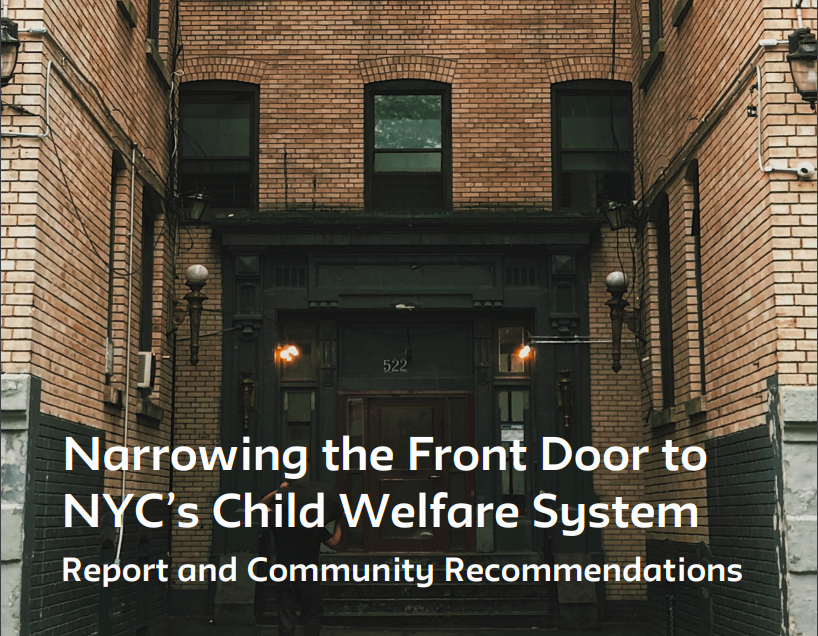
A high profile group of attorneys, government employees, policy experts and community organizers have produced a lengthy set of recommendations on how to “narrow the front door” to the child welfare system.
The group’s conclusions are far-reaching and would require far more than mere tweaks. Among them: “Shrink, and ultimately eliminate, mechanisms of surveillance, reporting, investigation, prosecution and punishment of families, particularly on the grounds of poverty framed as ‘neglect.’”
Youth and parents directly impacted by the foster care system also contributed to the report released today, which calls on city leaders to provide more direct financial support for families of color in struggling neighborhoods — well before calls are made to child protection hotlines and family homes are investigated.
The goal of the Narrowing the Front Door Work Group “is embodied in its name,” the report states — “to narrow the front door to the family regulation system through which too many families and children have been forced for too long.” After consulting with more than 400 people, members concluded “it is well-documented that the so-called ‘child welfare’ system has contributed to generational harm and disadvantage to Black children and families directly traceable to this country’s shameful and debilitating history of slavery and institutional and systemic anti-Black racism.”
The report offers a roadmap to what it describes as “An Anti-Racist Approach to Shrinking New York City’s Child Welfare System and Promoting Black Child, Family, and Community Wellbeing.” Its recommendations to city and state legislators, mandated reporters, child welfare officials and other social service agencies were crafted in a series of four convenings this year and last.
The dozens of recommendations include:
- Enacting bills currently before the state Legislature that would eliminate family separations except in cases of actual or imminent physical harm, and require child welfare workers to inform all parents of their right to legal representation at the outset of every investigation.
- Investing in schools’ ability to offer material support to families in need as an alternative to reporting them for neglect, given that city schools provide almost one-fourth of all referrals to child protective services.
- Providing “unrestricted” financial support to families “in ways that are disentangled from the family regulation system and avoid the so-called ‘benefits cliff,’ where additional support supplants other public benefits. Supports to avoid foster care referrals should include guaranteed income, cash transfers, childcare and housing help.
- Moving foster care prevention work out of the control of the child welfare agency — that has the power to remove children from their homes — and shift the responsibility to a community-based organization: “That would create a real separation between services and the family regulation system.”
- Reducing child protection hotline calls by educating the public and mandated reporters about the consequences of reporting parents, and the long-term harm and trauma caused by investigations, surveillance and family separation.
- Establishing an Accountability Council, “led by parents and youth with lived expertise,” to design a strategy for reducing abuse and neglect reports and investigations. The council’s aim would be to promote “healing, repair, and prevention of future injury.”
Two of the founding co-chairs of the working group went on to hold positions in the New York City Mayor Eric Adams’ administration: Anne Williams-Isom, a deputy mayor overseeing health and human services, and Jess Dannhauser, commissioner for the Administration of Children’s Services.
The report released today describes these mayoral appointees as leaders who “have demonstrated their commitment to addressing the demonstrated harms of the family regulation system,” and calls on them to help mitigate those harms.
The full list of recommendations is available here.
Other news outlets don’t cover child welfare and juvenile justice like we do.
News for people, not for profit.





